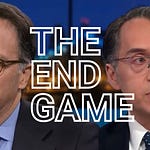Dear Subscribers,
Today we continue with Part 2 of this week’s Questions Answered.
I discuss three topics (I spoke on Substack about two others yesterday).
TODAY, March 4th:
Vladimir Trump?
This week, Donald Trump seems to have disproved his "Russia Hoax” refrain. I discuss why this still matters.
🔒 SCOTUS & Presidential Immunity – The implications of the Supreme Court’s decision for upcoming litigation.
🔒 The Eric Adams Case – An important new court filing and my take on what’s next.
YESTERDAY, March 3rd:
The poor treatment of federal employees and what can be done about it.
🔒 How to Stop Elon Musk? – Breaking down the legal battles and challenges ahead.
Today: All subscribers can watch the introduction and discussion of the third topic in the above video; paid subscribers will also automatically hear, in the above video, my discussion of the fourth and fifth topics. If you want to just watch the discussion of a particular topic, they are also all below, as are transcripts.
For paid subscribers you can submit questions, for next week, by using the reply feature in the Substack “chat” linked here.
Thank you all for being a part of this community, and as always, keep the great questions coming.
–Andrew
P.S. To watch on YouTube, click here.
INTRODUCTION:
Donald Trump & Russia – Why the "Russia Hoax" Is Anything But, and why it still matters.
TRANSCRIPT (PUBLIC)
Hi folks, welcome to this weekly feature where I answer five questions—or try to answer five questions—that were posed by you. Some of these are more topics than questions because I got a lot of questions that are very similar and are about the same topic, so I sort of grouped them into a single topic.
They’re really fun. I have to tell you that I hope you enjoy them. I actually really enjoy reading your questions, thinking about the answers, selecting them, and then it’s really fun to do this, pass on my thoughts, and keep them coming. It’s a really nice thing to have that interaction.
So I hope you enjoy it.
One of the questions I periodically get on air at MSNBC, but also in real life from colleagues or even strangers who come up to me now—also from subscribers—is essentially the issue of Donald Trump and Russia, what Donald Trump repeatedly calls the “Russia hoax.”
And in some ways, he keeps on repeating that as a mantra with the idea that if you say it long enough, people will believe it. And also, it just becomes a catchphrase that’s a shorthand for something that’s not true.
And I think right now, it’s a good time to remind ourselves that just because Donald Trump says it doesn’t mean it’s true, obviously. But more than that, there are two things to pull apart.
One is that there’s no question whatsoever that Russia interfered and tried to affect the 2016 presidential campaign, including actually also the primary, on the side of Donald Trump. That is documented over and over again—not just in the Mueller report. Full disclosure, I worked on that report. I was one of the prosecutors, and I was assigned not to the main Russia piece, but to everything Paul Manafort-related.
And even if you don’t take that to the bank, there is a bipartisan report that the Senate issued—the Senate Intel Committee. And you know who was on that? Marco Rubio. He’s very aware. And it’s such a shame because the fact that a foreign government was trying to interfere with our election—and by all accounts, Russia and other countries are continuing to do the same—should be an issue that has bipartisan support to try to prevent.
That’s sort of one thing.
The second piece is whether anyone in America, up to and including Donald Trump or anybody on his campaign, was in fact working to conspire with—or as the president likes to say, collude with—Russia. That’s a very separate issue from what the foreign country was trying to do.
Our report showed that with respect to 2016, there was no question that there were numerous efforts within the Trump campaign—various people who were solicitous of and trying to and supportive of Russian aid. Very famously, there was a Trump Tower meeting where Donald Trump’s son, Don Jr., in writing, was actively saying that he wanted the help that was being offered by some Russian emissaries.
All of that is complicated, and there are different levels of involvement, but ultimately that piece showed that, or at least we didn’t find, that there was sufficient evidence to charge a conspiracy—as opposed to Russia doing it and people in the Trump campaign wanting to see that happen.
And obviously, in my view, the most damning fact was that Paul Manafort was ordering internal polling data to be transmitted to somebody who was sort of his right-hand man in Ukraine, and that went on to Russia. And the various reasons that we outlined for why we think that was going on—but that certainly is very unusual, to have that kind of internal polling data being sent over.
All of that might make some people think, “Why is Andrew talking about this? It’s 2016.” And it’s because it’s come up again in terms of this issue of why Donald Trump has such an affinity for Vladimir Putin.
You need to start by looking at what Pam Bondi, the attorney general, did in her first week in office, which was to basically dismantle—not basically, she did dismantle—the task force that was put together to counteract foreign interference in our elections.
The people at the Department of Homeland Security, the CISA group that are there to check on election fraud and election interference domestically, were also dismantled, and their heads lopped off. That’s all publicly reported.
So you have to ask yourself: Why would you possibly do that? What would be the reason?
And then you have what is really extraordinary, because this is an area where you actually are seeing Republicans in Congress pushing back. You have the president of the United States essentially switching sides and saying that Ukraine’s at fault. Ukraine invaded itself. Ukraine is run by a dictator.
You have the recent, absolutely deplorable conduct of the president and vice president with respect to President Zelensky of Ukraine. And all of the things that are being said and done just seem like our president and vice president are mouthpieces of the Russian propaganda machine.
And this is so reminiscent of something that happened early in Trump 1.0 when Donald Trump went to Helsinki and met with President Putin. And there was a press conference afterward, and he was asked about Russian interference in the election. And the president said, “I know that the intelligence community is saying that happened, but I have no reason to think that’s what’s going on, because President Putin has powerfully denied it.”
And this is just my opinion—nobody can be that stupid. It just can’t be, “Oh, well, he’s just a dupe, he actually believed that.” If you believe that, you shouldn’t be president. And if you don’t believe it, not only are you not truthful with the American public, but you have to ask why.
And the question I have is: Why is Pam Bondi getting rid of the people who would counteract and try to reduce the risk of foreign election interference in our elections? Why would you get rid of the people who are tasked with making sure our elections here domestically are not fraudulent—a group that was run by Republicans and Democrats, not a partisan group?
The people who ran that group under Trump 1.0 were summarily dismissed—the head of it was fired—because he said there was no election fraud. But that was his person who was saying that.
Why would you get rid of those people? And why would you side with President Putin in connection with the Ukraine war?
It is topsy-turvy in terms of international law and the rule of law, where you’re saying might makes right—where you can have a country be the aggressor and invade another sovereign entity for no reason.
And we’re not only not condemning it in the United Nations, we are siding with authoritarian regimes saying that’s fine.
Is that the world that we want to live in? That is not the rule of law. That is the law of the jungle.
Final point on this—for those people who are in business and thinking, “Well, this might be good for business because you might reduce regulations and have fewer governmental restrictions,” and are thinking there’s a bright side here.
The reason that companies want to do business here is because of the rule of law. It’s because this is not the law of the jungle, where you have to worry about bribing people to get business, bribing them to stay in business. Where, if somebody breaches a contract, there are consequences. People can put things in writing and know it will work. There’s certainty because of the rule of law.
All of that goes by the wayside if you have a presidency that believes everything is transactional and there is no law.
Whether it’s domestic law, where we’re seeing people being fired and all sorts of challenges to the legality of what’s going on here, or what I’ve been talking about—the complete collapse of international norms and law with respect to how nations treat each other.
Listen to this episode with a 7-day free trial
Subscribe to Behind The Headlines to listen to this post and get 7 days of free access to the full post archives.













